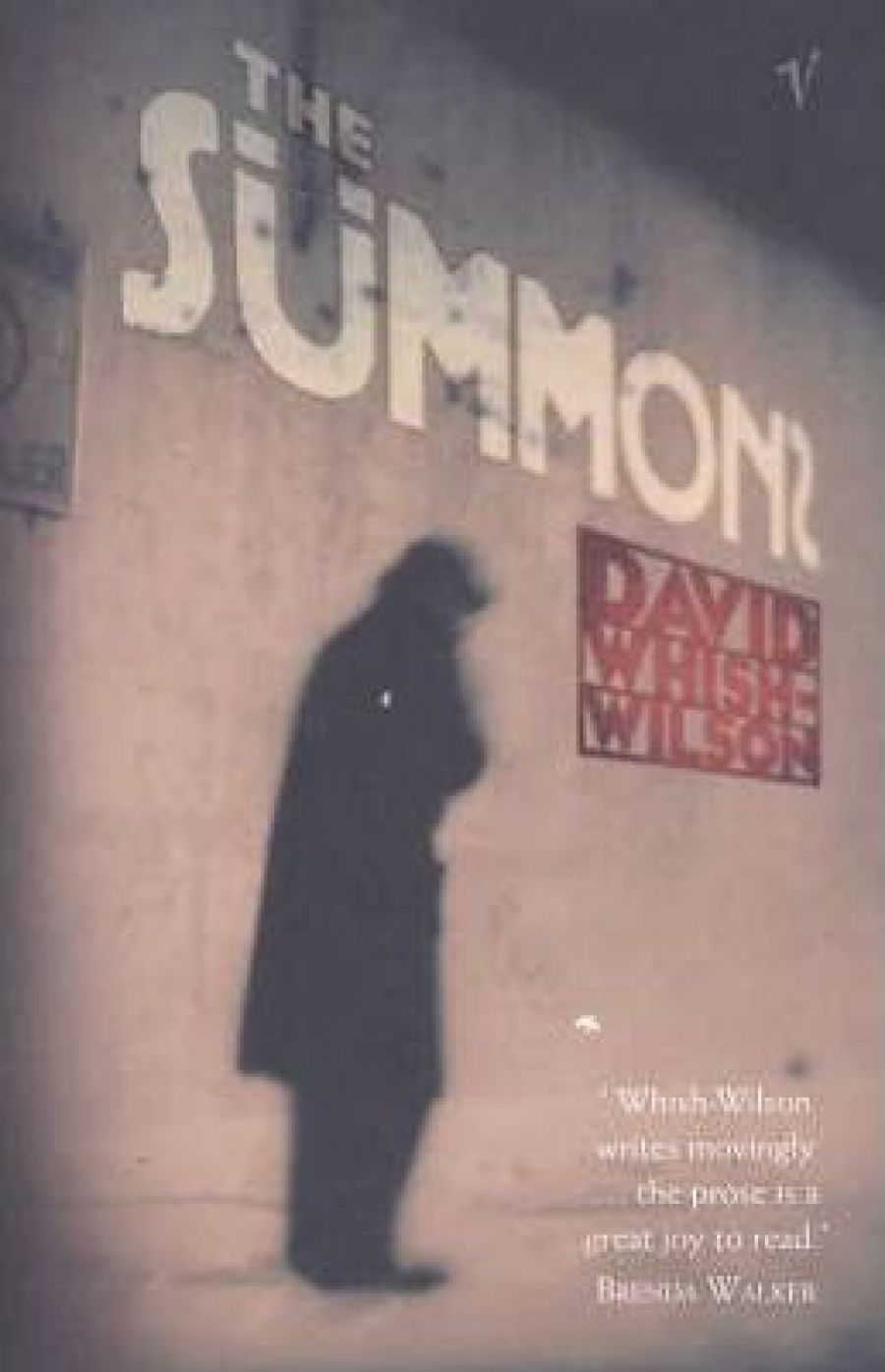
- Free Article: No
- Contents Category: Fiction
- Review Article: Yes
- Online Only: No
- Custom Highlight Text:
The past is not dead. In fact, it’s not even past; it keeps coming back as different novels, and writers do things differently there. Nazi Germany remains history’s prime hothouse from which to procure blooms for fiction’s bouquet. All those darkly perfumed spikes – drama and tragedy intrinsic, memory within recall.
- Book 1 Title: The Summons
- Book 1 Biblio: Vintage, $23.95 pb, 288 pp, 1740523886
Flade, searching for the Aryan roots of the Nazi religion, is at the ‘Witch Special Work Unit’, one of Reichsfuhrer Himmler’s mystic outfits. Mobius, haunted by his war experience and contemptuous of the project’s irrationality rejects the offer. His ‘family’ awaits him in the slums: his neighbour and mentor, the booted, sausage-bearing Gustav, with Carl, his beloved, simpleton grandson. The old man seems to have been imported from a shtetl: ‘Gustav … was permanently in flood … If Mobius’s father had held back from sharing stories and advice and thoughts and feelings then Gustav had been his foil. In front of his father he would regale Mobius with jokes and anecdotes and inspired suggestions that made him giddy with so much loosed language.’
To escape from Flade, and an attempt by the Reich to remove the ‘feeble-minded’ Carl, the small group flees to stay with Hannelore, Gustav’s sister in the country. Here, Mobius finds love again – or, as the blurb puts it, ‘an autumn romance’ – with the dynamic Monika. ‘Monika unsettled him … It wasn’t only her thighs straining beneath a woollen skirt, that demanded his attention. Nor was it the disturbing pricks of heat in the palms of his hands, hands that desired so much to touch her.’ This love-at-first-sight catalogue extends to ‘her deep smoker’s voice’; ‘dark eyes’ containing ‘fierce and cunning humour’; ‘the strong bridge of her nose’; her ‘scent, her smell, the fragrant essence’ and beyond. Then, accepting a cigarette, she says quietly: ‘What interesting eyes you have!’
Soon Mobius will be staying with ‘this woman who painted her walls yellow but slept throughout the day, this woman whose diet consisted, as far as he could tell, of biscuits, cigarettes and cognac’. Soon enough he will be sharing ‘scrambled eggs and fish straight from the can’, drinking from her ‘inexhaustible supply of cheap brandy’ and taking drives in the countryside. It’s a busy time: in this warm embrace, Mobius confronts his war memories; a personal tragedy strikes; and another assault on Carl’s freedom is foiled. But then Flade returns with the summons to a seminar at a castle, where Mobius’s early work will be exploited.
It is in the last forty pages that the book shifts up a gear. Within the cold stones of the witchy Wewelsburg Castle, black uniforms loom and hoarfrost is in the air: Himmler’s Camelot, and school for the SS élite. ‘Wiligut [Himmler’s Rasputin] was shouting about spiritual degeneracy … “Enough of independent inquiry and the empirical method! It is faith, not facts, that have sustained us down the years. Where our feelings conflict with the facts, then through the energetic exercise of the will and effective persuasion we must simply alter the facts!” … Wiligut sat to wild applause.’ Now Mobius learns the ‘dark secret’ promised on the book jacket, a shock supported by the dénouement.
One of the morals of this story seems to be, yes, love’s redemptive power. Another, rather occluded by the first, is the danger to dissent and difference – and reason – in a time of compulsory nationalism. Alas, that burden is laid on poor Mobius, that infinite loop of a single dimension – idealistic, shaky and impotent. Whish-Wilson’s prose – ornamented, strewn with aperçus – often slides between a veneer of high polish and the rougher grain of uncertain taste. The media age we live in is retuning our reader’s responses. History, this history, is a hard rock for fiction to fetch up against. In Reading the Holocaust (1998), Inga Clendinnen moots that, in reading fiction, she has ‘no human responsibility towards these people. Although they may be more intimately known than my most intimate actual others, although they may often seem very much more “real”, in the end my compassion is a fiction too, because I know they are fictions.’ It’s an unfair comparison, of course, but one might pick up a compact book such as Hugh Trevor-Roper’s The Last Days of Hitler (1947) and find on every page lessons to disturb and move beyond fiction’s fondest hopes.


Comments powered by CComment